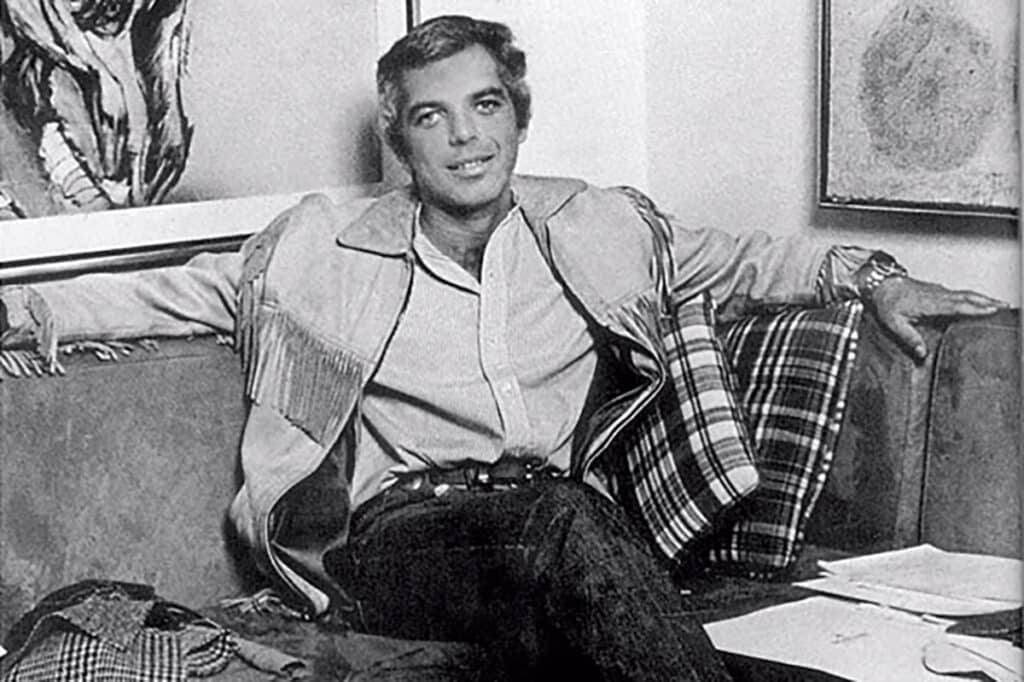
From the iconic Polo logo and the groundbreaking wrap dress to the Levi’s blue jeans that would revolutionize the world, Jewish designers have been behind some of the most influential staples, trends and innovations in the fashion industry.
These designers have pioneered iconic fashion houses and shaped contemporary trends, leaving lasting marks on the industry. Their creativity, innovation, and cultural influences have transformed runways and redefined how we perceive style.
Here are eight fashion designers you probably didn’t know are Jewish:
Zac Posen
Zac Posen’s interest in fashion began when he was attending synagogue with his grandparents, where he would creatively repurpose yarmulkes into ball gowns for his dolls.
Since then, Posen has become a well-respected designer known for his feminine silhouettes. Famous for his anatomical construction and textile manipulation like draping, this born-and-bred New Yorker’s designs have been worn by the likes of Sarah Jessica Parker, Gwyneth Paltrow (both Jewish!), Oprah and former First Lady Michelle Obama.
In 2021, Posen delved into his Jewish heritage on the show “Finding Your Roots,” where he discovered his family’s deep ties to craftsmanship and the apparel industry.
Historian Henry Louis Gates Jr., who hosts the show highlighted a poignant contrast: While Posen’s great-great-great grandfathers were tailors out of necessity, Posen chose to pursue fashion design, elevating it into a celebrated artform.
Beyond fashion, Posen has also been vocal about the recent rise in antisemitism, having appeared in the Emmy Award-winning documentary, “Recipe for Change: Standing Up To Antisemitism.”
Ralph Lauren
Ralph Lauren stands out as a stalwart of all things preppy. While his multi-billion dollar fashion empire is often associated with WASP culture, it may come as a surprise that the iconic designer was originally named Ralph Lifshitz.

Born to Belarussian immigrants, Frieda and Frank Lifshitz in the Bronx, Ralph and his brothers decided to change their surname to Lauren because of the relentless bullying they faced. After completing day school, Lauren attended the Manhattan Talmudical Academy (the boys’ high school of Yeshiva University) in Washington Heights.
Despite coming from a warm and loving home life, he longed to distance himself from his Eastern European community and fully embrace Americana. To Lauren, that meant finding beauty in diverse elements of American culture like the American West, Old Hollywood à la Marlon Brando and Audrey Hepurn, and the preppiness of the Ivy League and upper-class equestrians.
“Very Ralph,” a documentary about Lauren’s career, described his vision that any person should feel stylish and confident in their clothes, no matter their background or financial status.
“He democratized the whole idea of what was stylish. The cowboy, the GI, the working man can be just as cool as an aristocrat,” the documentary states.
Early in his career, while designing his wide, colorful, and handmade ties under the “Polo” label, Lauren refused to compromise on his vision. The 1960s “Mad Men” aesthetic of slim ties and structured suits in shades of gray, encouraged Ralph Lauren to debut his linen tie-back men’s suits inspired by 1930s gentlemen. Described by a journalist as “straight off of Gatsby’s lawn,” Lauren wove narratives throughout his designs, a novel concept in menswear at the time.

“People ask how can a Jewish kid from the Bronx do preppy clothes? Does it have to do with class and clothes?” Lauren reportedly said. “It has to do with dreams.”
Despite lacking any savings, Lauren walked away from a meeting with Bloomingdale’s when they insisted on using their labels instead of the Polo label on his ties. This bold determination epitomized the quintessential gutsy chutzpah that has propelled the success of many before him.
Among Lauren’s many accomplishments and accolades are the Council of Fashion Designers of America (CFDA) Lifetime Achievement Award in 1991, Womenswear Designer of the Year (1995), and Menswear Designer of the Year (1996, 2007) as well as its Fashion Legend Award (2007).
In the early days of the Israel-Hamas war, Ralph Lauren donated an undisclosed sum to humanitarian efforts within Israel.
Donna Karan
Known as the Queen of Seventh Avenue among fashion insiders, Donna Karan played a pivotal role in revolutionizing the working woman’s wardrobe during the 1980s.

Karan was born in the Forest Hills neighborhood of Queens and later moved to the Five Towns, a Jewish enclave on Long Island with her mother and siblings. She followed a traditional path in fashion, attending the Parsons School of Design, then working under the guidance of fellow Jewish designer Anne Klein.
Before Karan’s label emerged, professional women often wore bulky, ill-fitting suits to mirror their male counterparts in an effort to be taken seriously in the workforce.
The New Yorker introduced the concept of Seven Easy Pieces, which centered around a versatile bodysuit that stayed tucked in. These seven interchangeable workwear essentials — a white shirt, little black dress, tailored jacket, pencil skirt, leather jacket, and cashmere sweater — gave women stylish, functional options that boosted their confidence in the workplace.

Deeply committed to the Jewish value of tikkun olam, Karan stepped down as the head of her company in 2015 to dedicate more time to her charitable organization, the Urban Zen Foundation. Since Oct. 7, Karan has hosted a fundraiser for the IDF and has been outspoken about her support for Israel.

Stuart Weitzman
Stuart Weitzman stands out among women’s shoe designers for prioritizing both form and function, insisting that a shoe must feel as good as it looks. Known for his comfortable-while-luxurious heels worn by A-list celebrities, three of Weitzman’s designs are listed among the world’s 10 most expensive shoes.
Descending from a family of shoemakers, Weitzman began his career apprenticing at his father’s factory, “Seymour Shoes,” and started designing shoes for the family business in the early 1960s.
In 1986, the Long Island native launched his own label, using the same Spanish manufacturer as his father.
Weitzman’s success is also intertwined with that of his former executive vice president and wife of 56 years, Jane Gershon Weitzman. She was the company’s founding vice president and used the brand’s storefronts and window displays to raise awareness for breast cancer and women’s health issues.
Since retiring from active roles in the company, Stuart and Jane have become philanthropic powerhouses, donating their time and money to Jewish organizations. The couple recently made a significant eight-figure donation to the National Museum of American Jewish History in Philadelphia, rescuing it from bankruptcy.
In an interview about his Jewish heritage, Stuart Weitzman remarked, “My family went to synagogue on holidays like traditional Jews do, but we didn’t keep a kosher home. Lox and bagels — that was our kosher home.” However, he and his wife did keep kosher during the early years of their marriage.
Kenneth Cole
Since its founding in 1982, Kenneth Cole Productions, Inc. has been defined by its high quality, timeless silhouettes and luxury.
Embodying the entrepreneurial spirit that often permeates the Jewish experience, Kenneth Cole rented a trailer two blocks from the New York Shoe Expo to preview his debut line when he couldn’t afford a showroom.
Upon realizing that trailer permits were exclusively granted to production and utility companies, the native New Yorker sought permission to film his company’s inception, a project which eventually became Cole’s full-length movie, “The Birth of a Shoe Company.”
Within just two and a half days, Kenneth Cole Productions managed to sell forty thousand pairs of shoes while simultaneously documenting the experience.
Even after stepping back from day-to-day operations of his company, Cole uses the brand and his personal platform to actively advocate for the LGBTQ+ community, gun control, and education.

In 2005, he designed a controversy-stirring t-shirt for World AIDS Day. The tees were emblazoned with either, “We All Have AIDS” or “I Have AIDS.” Cole’s intention was that individuals, regardless of whether they had AIDS or not, would wear the shirts and help reduce the stigma associated with the disease.
“There is a legend of the Danish king, Christian X, who, during World War II, when Hitler insisted all Jews publicly wear a yellow Star of David, would wear the star himself, hence making it difficult to differentiate who was Jewish. This is kind of like that, hopefully,” Cole said at the time.
Since Oct. 7th, Kenneth Cole has been very supportive of Israel, even appearing in an Israeli TV commercial to show solidarity with his fellow Jews.
Diane von Fürstenberg
Diane von Fürstenberg is credited with designing one of the most iconic items of clothing in the 20th century — the silk jersey-knit wrap dress. The famed fashion innovator has been hailed as “the most marketable woman since Coco Chanel” by Newsweek.

Born Diane Simone Michele Halfin to a Jewish-Romanian father and Greek Holocaust-survivor and resistance fighter mother, Fürstenberg considers her life a miracle. Her mother, who weighed only 49 pounds upon her release from Auschwitz, was advised by her doctor not to have children, as she likely wouldn’t survive childbirth. Fürstenberg has frequently discussed the profound impact her mother had on her life, acknowledging her for instilling the belief that “fear is not an option.”
Designed in the 1970’s, Fürstenberg’s wrap dress came to be seen as one of the symbols of the women’s liberation movement. However, her impact extends far beyond the garment.
Fürstenberg has written several books, including “Diane: A Signature Life,” “The Woman I Wanted to Be,” which was translated into eight languages, and “Own It: The Secret to Life.”
The recipient of countless prestigious awards, she was inducted into the National Women’s Hall of Fame in 2019 and she received the Chevalier de la Légion D’Honneur from France in 2020, the Commandeur de l’Ordre de la Couronne from her native Belgium in 2021, and the Justice Ruth Bader Ginsburg Woman of Leadership Award in 2022.
Fürstenberg is a strong believer in giving back and making the world a better place, particularly for women. She, along with her husband, Barry Diller give five awards annually to “women who have demonstrated leadership, strength, and courage in their commitment to women’s causes.” The Diller-von Furstenberg Family Foundation grants each honoree $100,000 for their non-profit organization to further their important work.
Elie Tahari
Emigrating from Israel to New York with less than $100 dollars in his pocket, Elie Tahari is the epitome of the American Dream. Tahari’s family left Iran to the nascent State of Israel in 1952. There, he attended multiple boarding schools before joining the Israeli Air Force.
Upon coming to the United States and spending his $100, Tahari was briefly homeless. But, like so many entrepreneurs, he never gave up and got a job as an electrician in a clothing boutique in Manhattan’s Garment District. After saving up a few thousand dollars, Tahari staged his first fashion show in 1977 at the legendary Studio 54.
Tahari’s brand is one of just three that make over $1 billion in sales and is still led by its founder 40 years after inception. Known for popularizing the tube top and designing Hilary Clinton’s famous pant suits, Tahari’s versatility speaks for itself.
Beyond his eponymous label, he is the co-founder of Theory, along with the brand’s current CEO, Andrew Rosen.
Just days after the tragedy of Oct. 7th, Elie and his wife, Rory attended a UJA Federation-organized rally. He shared that his family in Israel was safe and that his 70-year-old friend volunteered for the IDF reserves. He said, “I was humbled for a week and cried, then, I finally picked myself up. [I’ve been] watching the news for three or four weeks now”.
Tahari also hosted a kosher-catered discussion and fashion show to raise money for Israel Bonds.
Michael Kors
Michael Kors is an acclaimed designer renowned for his luxe accessories and ready-to-wear collections, which captivate the masses with their timeless sophistication. Kors is credited as the first designer to popularize off-the-rack women’s clothing.

A Long Island native, Kors (born Karl Anderson Jr.) had a devoted and supportive “Jewish fashion mother” by his side every step of his journey.
Joan Kors, who passed away in 2023, was a model and successful interior designer before joining her son’s company in the role of West Coast brand ambassador. Joan encouraged her son’s passions from a young age, even allowing him to design her wedding dress when she remarried Bill Kors. The mother and son duo took her new husband’s last name and Joan allowed her son to choose a new first name as well, formally becoming Michael David Kors.
The one thing he regrets letting his mother do? Making the color scheme of his bar mitzvah mustard and brown.

The designer compared the thrill of a fashion show to a bar mitzvah, telling Style.com, “The show is definitely my Bar Mitzvah. I throw two Bar Mitzvahs a year—I always say that! Except my bar mitzvah was in the seventies and it was full of really ugly colors.”
Kors’ creations have been adorned by celebrities such as Nicole Kidman, Jewish comedian Tiffany Haddish, and notably, Michelle Obama for her official first-term portrait.
On Oct. 23 2023, Kors announced that he will match the donation made by Capri Holdings Ltd., the parent company of his eponymous brand, to the International Committee of the Red Cross (ICRC) to aid those impacted by the conflict in Israel and Gaza.
Originally Published Jun 19, 2024 03:55PM EDT
